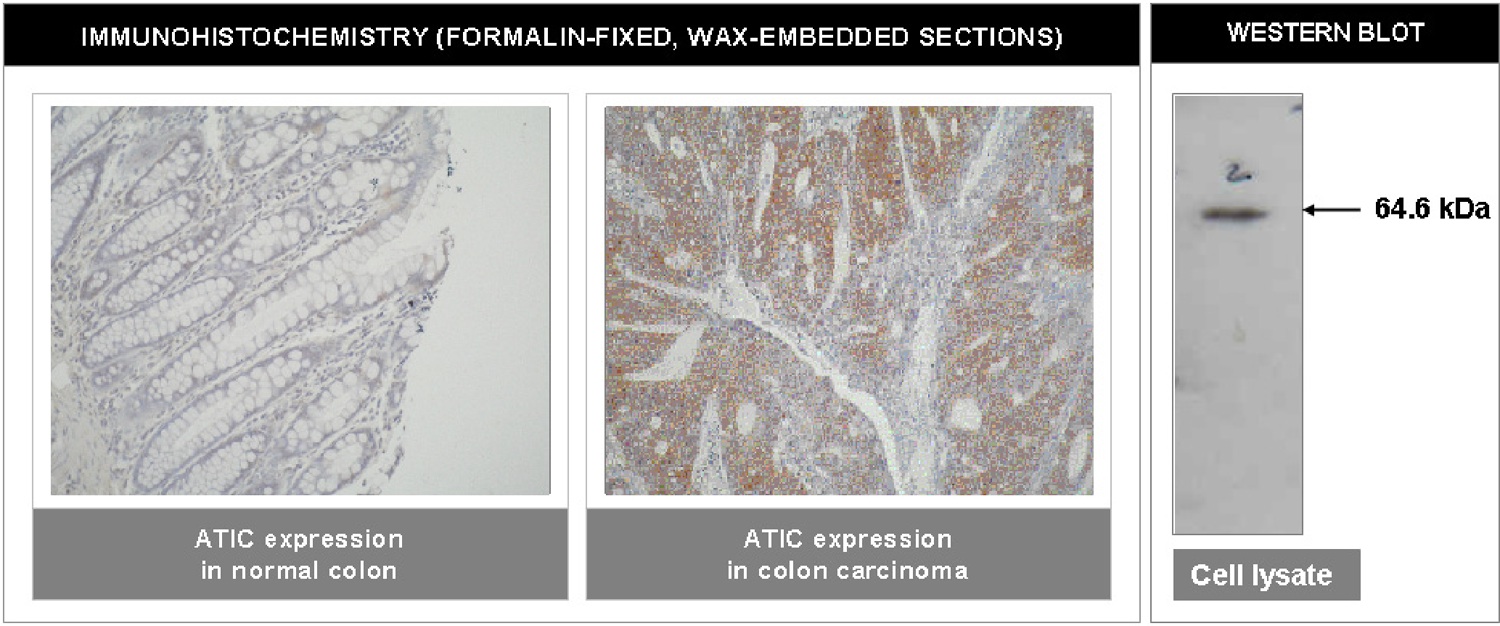Catalogue

Mouse anti Human ATIC
Catalog number: X2062M| Clone | F38 P7 H9 |
| Isotype | IgG1 |
| Product Type |
Monoclonal Antibody |
| Units | 200 µg |
| Host | Mouse |
| Species Reactivity |
Frog Fruit Fly Human Mouse Rat |
| Application |
Immunohistochemistry Western Blotting |
Background
The bifunctional purine biosynthesis protein PURH contains phosphoribosylaminoimidazole carboxamide formyltransferase, also designated AICAR transformylase, IMP cyclohydrolase or Inosinicase. AICAR plays an important role in purine biosynthesis, specifically in the production of nucleotides and IMP. Defects in ATIC, the gene encoding for this protein, can cause AICArebosuria, also designated AICA-ribosiduria, an inborn error in purine biosynthesis that is neurologically cataclysmic. Individuals with AICA-rebosuria accumulate AICA-ribotide, also designated ZMP, and its derivatives in erythrocytes and fibroblasts and also excrete very large amounts of AICA-riboside in the urine. Mental retardation, epilepsy, dysmorphic features and congenital blindness are all symptoms of this disease.
Synonyms: AICAR; AICARFT; AICARFT/IMPCHASE; PURH; 5-aminoimidazole-4-carboxamide ribonucleotide formyltransferase/IMP cyclohydrolase
Source
Immunogen: Hybridoma produced by the fusion of splenocytes from BALB/c mice immunized with a synthetic peptide derived from the human ATIC protein and mouse myeloma Ag8563 cells. Sequence common in frog, fruit fly, rat and mouse.
Product
Product Form: Unconjugated
Formulation: Provided as solution in phosphate buffered saline with 0.08% sodium azide
Purification Method: Protein A/G Chromatography
Concentration: See vial for concentration
Applications
Antibody can be used for Western blotting (1-2 µg/ml) and immunohistochemistry on formalin-fixed, paraffin-embedded tissues (1-5 µg/ml). Optimal concentration should be evaluated by serial dilutions.
Functional Analysis: Western Blotting
Positive Control: Colorectal cancer tissue.
Storage
Product should be stored at -20°C. Aliquot to avoid freeze/thaw cycles
Product Stability: See expiration date on vial
Shipping Conditions: Ship at ambient temperature, freeze upon arrival
Caution
This product is intended FOR RESEARCH USE ONLY, and FOR TESTS IN VITRO, not for use in diagnostic or therapeutic procedures involving humans or animals. It may contain hazardous ingredients. Please refer to the Safety Data Sheets (SDS) for additional information and proper handling procedures. Dispose product remainders according to local regulations.This datasheet is as accurate as reasonably achievable, but Nordic-MUbio accepts no liability for any inaccuracies or omissions in this information.
References
1. Bulock, K.G., et al. (2002). The kinetic mechanism of the human bifunctional enzyme ATIC (5-amino-4-imidazolecarboxamide ribonucleotide transformylase/inosine 5'-monophosphate cyclohydrolase). A surprising lack of substrate channeling. J. Biol. Chem. 277(25):22168-22174.
2. Marie, S., et al. (2004). AICA-ribosiduria: a novel, neurologically devastating inborn error of purine biosynthesis caused by mutation of ATIC. Am. J. Hum. Genet. 74(6):1276-1281.
Protein Reference(s)
Database Name: UniProt
Accession Number: P31939
Species Accession: Human
Safety Datasheet(s) for this product:
| NM_Sodium Azide |

|
"Left and Center: Immunohistochemical staining of normal colon tissue and colon carcinoma tissue using ATIC antibody (Cat. No. X2062M). Right: Western blot using ATIC antibody on HT29 cell lysate." |

"Left and Center: Immunohistochemical staining of normal colon tissue and colon carcinoma tissue using ATIC antibody (Cat. No. X2062M). Right: Western blot using ATIC antibody on HT29 cell lysate."
